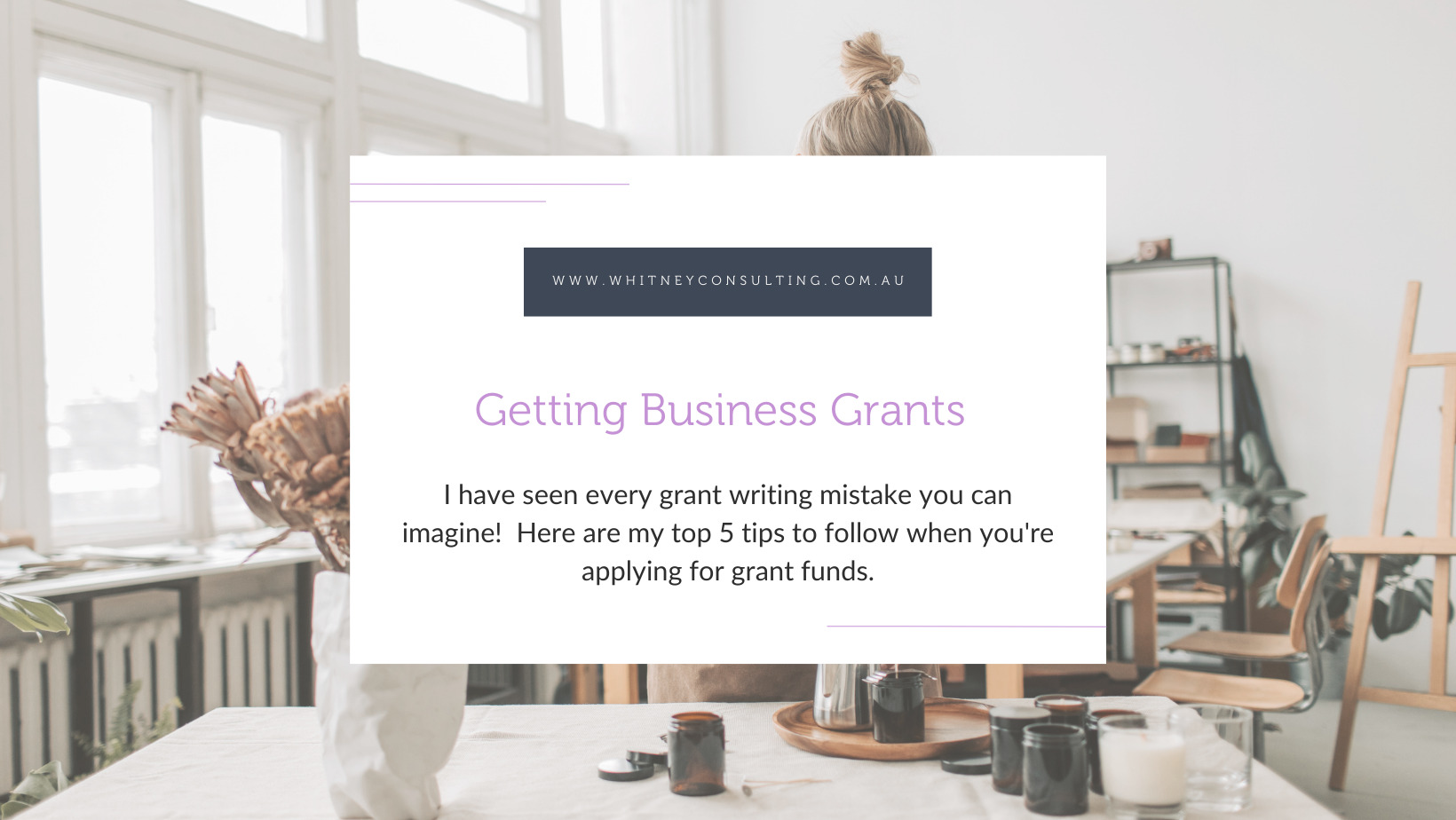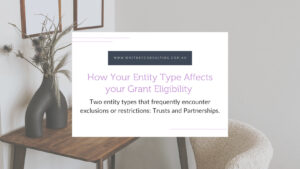I have seen every business grant writing mistake you can imagine! Before becoming a professional grant writer, I spent 8 years assessing over 1 billion dollars’ worth of grants for WA’s largest business grant funding program. To help you avoid some of the more common mistakes, I have put together a list of 5 tips to follow when you’re applying for grant funds. Believe me, if you follow these, your assessor will be very thankful.
Tip 1: Read the guidelines!
Common sense, right? But it’s amazing how many people submit an application to a business grant that they are not eligible for, or don’t actually answer the questions in the application.
Before you start writing, take the time to read the eligibility criteria carefully and make sure your organisation and your project meet the criteria. If your business employs 25 people but the grant criteria states that businesses with 10 or under employees are eligible, you would have wasted your time in applying.
The grant guidelines also tell you why the funding body is giving away money. What are they trying to achieve by providing the funds? Showing the funding body that your project will meet their objectives is key to writing a successful funding application.
Lastly, the guidelines contain the assessment criteria. These are the critera on which your application is scored. You need to answer the question that is asked – don’t get caught up in talking about how great your project is and forget to answer the specific question. I have seen this happen a lot and the assessor cannot score you well if you haven’t answered the question – no matter how great your project might be. Keep a copy of the assessment criteria handy when writing the business grant and constantly refer back to them to ensure you are answering the question. Then check again at the end!
Tip 2: Answer the six key questions
Every business grant application is different in size, what it asks you and how it asks you to provide the information. There will be a series of questions in the application that you will be required to address (the assessment criteria) but they are not the only questions you will need to answer in order to produce a strong grant application.
There are six key grant questions that need to be addressed in every application, no matter the amount of funding you are asking for or the type of business grant. Answering these questions shows the funding body how you will give them what they are paying for and proves you won’t waste their money. It won’t necessarily be clear where these questions must be answered in your application, however funding bodies need to know this information in order to determine whether they should fund your project and your organisation.
I recommend you go back through the finished draft application and tick off that these questions have been answered somewhere.
The key questions you need to address in ALL grant applications are:
Why?
You need to tell funders WHY your project is needed. This means that you have to demonstrate a need for the project within your community and/or target group, along with the benefits that will be achieved by receiving funding for your proposed project. Your project might be fabulous but if there is already another organisation doing the same thing, or if there is no demand for what you will provide, then it is not ‘needed’.
Make sure your project ‘why’ is linked to the funding body’s ‘why’; their reason for giving away the money.
What?
This answer usually fits in to a section where you are asked to describe the proposed project. The most important thing to remember about the project description is that you are telling assessors exactly WHAT you will do – no emotion or sales pitch here, just cold, hard facts. Lay out what you will achieve and what work has to be done to deliver the project. This is not the place for benefits, just actions.
Who?
You need to tell the funding body who will help you to deliver the project, who supports the project and who it will benefit; who is it for? Go through the actions you have said you will complete in your WHAT section and identify any stakeholders.
When considering stakeholders, you should ask yourself the following three questions:
- Who do you need to help you complete the project?
- Who could stop you from completing your project?
- Who will benefit from your project?
These are your major stakeholders and partners and you need to show the funding body that they support and will utilise your project, usually via letters of support or signed agreements.
When?
Your project timeframe and milestones. Again, go through your WHAT and break it down into project tasks. In order to deliver your project, what steps will you complete, from beginning to end and how long will each of these steps take? Do not forget to include timeframes for any required approvals and ensure you allow sufficient time for the business grant application to be assessed before the project starts. A timeframe that has the project starting a month after the application is due is not realistic. Allow 3 months for government grant applications to be assessed and funding formalised in to an agreement. Also keep in mind that it is rare for a project to finish on time, so be generous with your time allocations.
How?
You will need to demonstrate how you will deliver your project. This includes the methodology, governance and procurement that will be in place. So, how will you complete the actions you have listed in your WHAT?
Methodology – how will you get the tasks done? Will you subcontract everything to an expert contractor? Will you design the facility/product and then put out a tender for its construction? Will you use volunteers?
Governance – How will the project be managed? Exactly who (meaning what is their name and experience) will manage the project and who will they report to; who will oversee the project to make sure it is implemented properly and there are no cost, time or scope changes. Is there a Board or a Committee?
Procurement – How will you procure any products or services you need? Will you use a mate of a mate or will it be an open, advertised opportunity? (Can you guess which one an assessor would prefer?!)
Cost?
Your project budget. It does not mean simply telling the assessor that it will cost $50,000 to complete your project. Your budget needs to itemise each of the elements of your project; and the cost of each; how much will the approvals cost, the administration, project management, equipment, construction etc?
You need to be clear what makes up the total project budget and include quotes and evidence of your costs. Don’t forget to include the cost of complying with grant conditions, such as audits or signage, in your budget.
Tip 3: Silence is deadly – be open and transparent
The third tip is to be open and not try to hide something by remaining silent. Many applicants think that if they have not completed a certain component of project planning then it’s best to not mention it. For example, you haven’t spoken to the local Shire to get them on board with your project? Let’s just not mention them as a stakeholder in the application and hope the assessor doesn’t notice…even though Shire approvals would be needed to do the project. I can assure you this is never a good idea!
Even junior assessors are trained and mentored to be able to pick up when important aspects of the project are missing. And missing information stands out as a sign of incompetence, meaning the viability of the project is brought into question.
If you have not been able to fully prepare your project before applying for funding (due either to time or lack of resources) detail what you have yet to complete and how you will complete it. Include the actions in your project timeline as something that you will do as part of the project. If it is something critical to the project success (e.g. some kind of approval) then you can also note that this action will be completed BEFORE any project funding is provided to you.
Tip 4: Pick up the phone
Assessors want to see quality, complete applications. Their job is to pick through every application and search for holes and issues, but they are hoping there won’t be any. It actually makes their job easier if they receive quality applications – and, speaking from experience, they don’t get a lot of them.
If you have a question while you are preparing your application, pick up the phone, send an email and ask. Assessors would prefer to answer a question than have to review a grant that has completely missed the point. Establishing a rapport with the funding body and showing them that you are putting in your best effort to deliver a quality application will only increase your chances of success.
Tip 5: Tell the story
You need to assume that the person assessing the application knows absolutely nothing about your project – tell them the story. I have assessed applications which were either written by someone too close to the project or written by an economic firm. In both these cases the story was missing. Whilst the economic firm had provided exceptional detail in the budget and cost benefit of the project, the history, background and implementation of the project were usually missing.
Don’t forget to bring the assessor along on the project journey with you – tell them the story about why the project is needed, where it has come from, how it will be delivered and what the impact will be. Yes, the evidence and detail is key, but don’t forget the story.
I hope these tips help you in your grant writing endeavours. When submitting an application for grant funding, there is never a guarantee of success, but if you keep the above tips in mind and you answer the key questions, you will dramatically increase your success rate.






